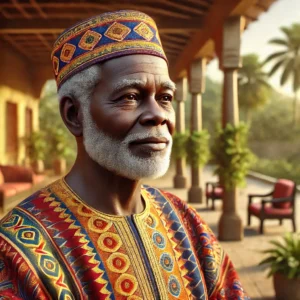Grandpa Okoro stood motionless, blinking rapidly as he stared at the gloomy, rain-soaked sky.

The smoke-laden ruins of an oil exploration company marred the horizon, their desolation contrasting with the blackened, unharvested crops on his farmland.
Droplets of crude oil clung to the earth, evidence of a cursed blessing turned bane.
He shook his head and shuddered, lifting his arthritic left knee with difficulty as he resumed harvesting his yams.
“What an awkward destiny for Okoronkwo,”
He muttered bitterly, switching to his native tongue,
“Okoronkwo Atamu-Afufu”
He Lamented, stressing the ceaseless suffering that had befallen him.
Grandpa Okoro was no ordinary man; his life had been a tale of toil and consequence.
Clearing his parched throat, he soliloquized with a voice hardened by years of labor, his misery reaching its peak.
He blamed his ill-fortune on Aju-Ani, the river goddess whose favor he had once fervently sought but had since abandoned.
“Deity is like good servant but a very bad master”!
He murmured and gnashed his age long gap teeth.
His allegiance to the deity Aju-Ani had waned after burning her rugged effigy, marking a reluctant repentance and the embrace of a new, uncertain faith.
In the remote village of Umu-Eze, the white-robed crusaders had arrived, bringing with them promises of hope, renewal, and salvation.
Their chants and hymns resonated in a land still scarred by the Nigerian-Biafran War of 6 Jul 1967 to 15 Jan 1970.
The scar of the war was still fresh in peoples mind even after a decade and half it was considered to have ended.
The villagers, disillusioned by years of suffering and deprivation, flocked to this newfound pentecostal faith of Obim-Dere-Dum, which ironically meant my soul should take solace in the Lord God.
Yet, as fervent as the devotion appeared, it was tinged with desperation—a common adage spoke of how hardship often led people to seek refuge in a white-garment churches.
Another sect which dramatically enticed Granpa Most.
For Grandpa Okoro, the greatest tragedy was the untimely death of his first illustrious son, a blow that shattered his resilience.
Repentance seemed necessary, not out of conviction but in hope of divine protection from further calamities.
Grandpa’s village, was a place where faith and superstition danced closely, often blurring the boundaries between divine will and human folly.
The elders regularly engaged in heated debates, weaving discussions of human fate, fetish practices, and paganism into the ever-present thread of religion.
These conversations were particularly poignant during the early 1980s, a time marked by political turbulence following the collapse of Nigeria’s Second Republic (1979–1983) and the rise of a new military junta president.
In stark contrast to the old ways, Pentecostal doctrines of morality began to gain traction, signaling a new era of spiritual awakening.
Evening gatherings by the kitchen hearth became a cherished ritual.
Families huddled around the crackling fire, listening intently to the radio’s faint signals.
News bulletins, filled with propaganda, became the backdrop to the communal roasting and eating of corn maize, fostering a mix of apprehension and curiosity about the changing times.
Grandpa, however, was unimpressed by the Pentecostal sects that began to proliferate across Umu-Eze. To him, these “mushroom churches” misinterpreted the sacred word of God, leading people astray with their doctrines.
His skepticism turned to disdain, when one such sect, the “Obim Deere Dum” congregation, established itself directly opposite his compound.
Named after their melodious early morning worship songs, the sect was relentless in its attempts to recruit Grandpa into their fold.
Despite their persistent invitations, Grandpa adamantly refused, standing firm in his belief that their practices deviated from the true path.
Although his outward disapproval, Grandpa found solace in their melodious Igbo worship songs every early morning. The lyrics, filled with hope and resilience, resonated with his struggles and provided a fleeting sense of peace.
Yet, he remained steadfast in his rituals—pouring libations to the earth and savoring his favorite London dry gin, an acts the new Christian converts scorned.
Grandpa Okoro was a man of deep pride and nostalgia, embodying the mystical spirit of African heritage.
His life was a paradox—caught between the pull of ancestral traditions and the tide of modern religious fervor.
In his story lay the echoes of a community grappling with change, seeking solace in faith, and yearning for a better destiny and renewed hope and aspiration.
Synopsis Illustration Derived from Black & White Nuptial
Taken from the chapter “The Haunting Echoes of My Childhood Cradle”












